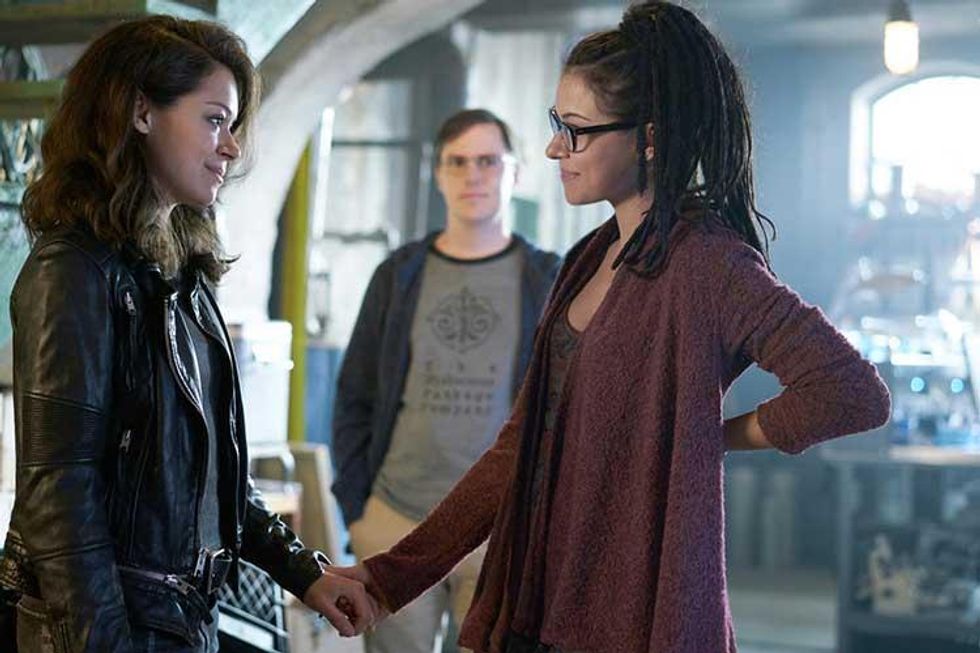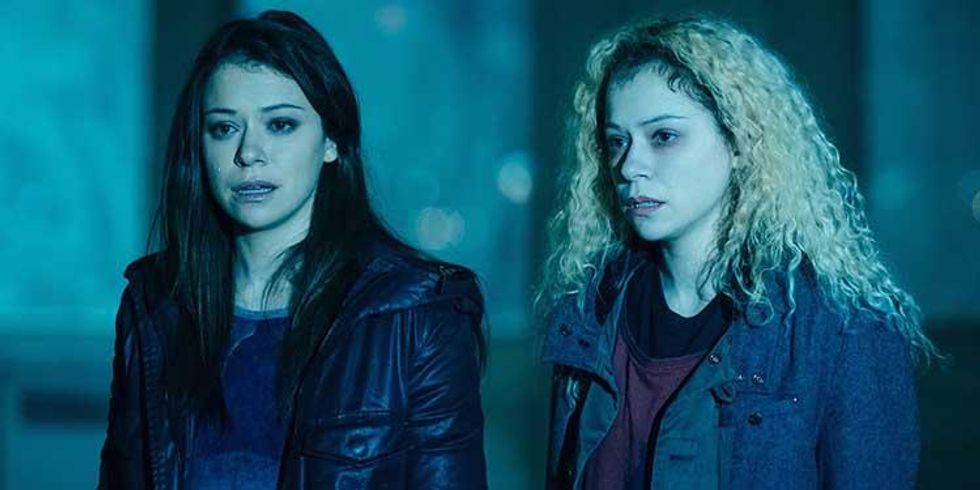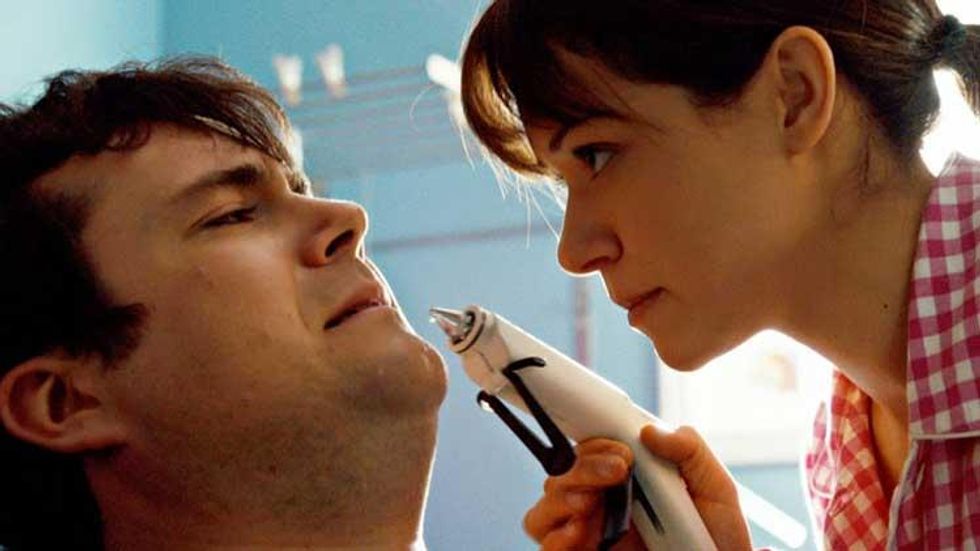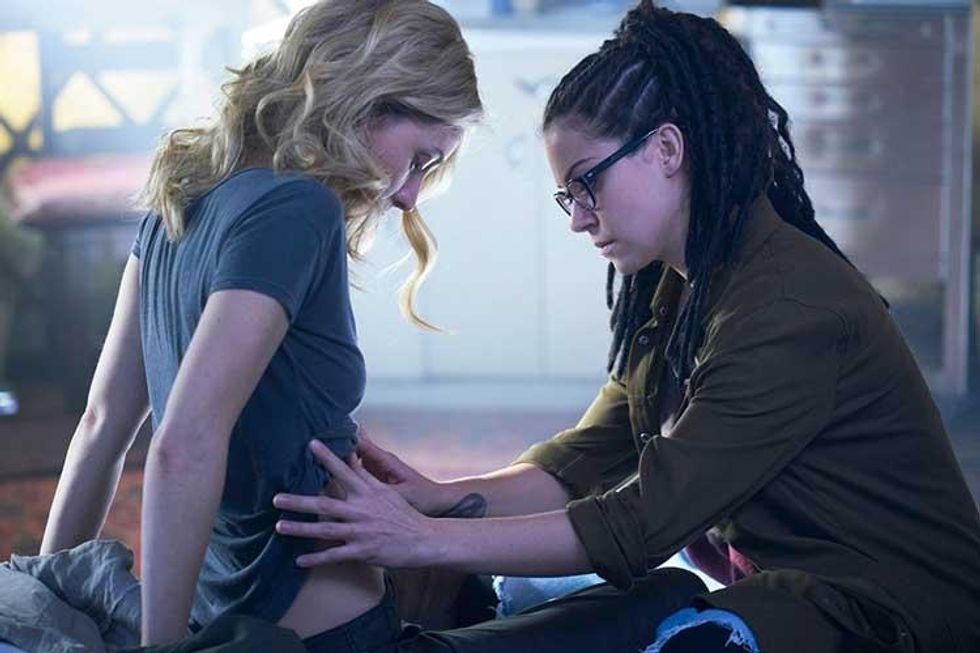A pragmatic and fearless Brit with a punk edge, a free-spirited lesbian scientist, a feral and fiercely loyal Ukranian outcast, and an uptight suburban mom who's killed when necessary... Any one of those women would surely make for fascinating television, but those are just the central four clones out of 11 that Tatiana Maslany has inhabited on five seasons of BBC America's addicting sci-fi series Orphan Black.
Maslany's imbued each of them with such distinction and nuance that it's easy to forget she's one actress investigating the show's themes of female agency, sisterhood, and family as the clones work to wrest themselves from a eugenics-obsessed maniacal patriarch in a plot that's become eerily prescient under the Trump administration. Not unlike the millions of women who came together to march against a common enemy last January, Maslany's clones, or "sestras," as the unpredictable Ukranian clone Helena calls them, are bound together by their commonality rather than their differences in a show that will go down as one of the most inherently feminist of its era.
"I feel so lucky to be on a show that puts women at the center," Maslany, 31, said when she won the Best Actress Emmy last September, an accolade long overdue considering the breadth of character and emotion Maslany had laid bare playing up to six different characters in any given episode for four seasons.
But her shout-out to women wasn't a one-off in the face of a Republican presidential nominee whose heinous treatment of women was well documented. It's not lost on Maslany that Orphan Black's creators, Graeme Manson and John Fawcett, created a vehicle so ahead of its time that it would become one of the few pieces of pop culture/art that could accommodate the surreal state of American politics.
"We've always been telling this story about agency and about autonomy and community and individuals and family -- chosen family and genetic family," Maslany told The Advocate. "But, Graeme [Manson], to his credit, had always seen this patriarchal head at the top of the snake and knew that was the thing that was stopping these women from having autonomy over their lives, that they were stuck in this system."
She added that she and Helen Shaver (the star of Desert Hearts) were poring over the script Shaver directed this season and railing against the injustices of the day coming out of the White House when they realized they had to move into issues rather than away.
"We have to be telling these stories. We have to be putting it right into what's going on," Maslany said of an episode in which the clone Cosima, the scientist, went toe-to-toe with P.T. Westmoreland, the charlatan who'd been pulling the strings of the clones.
 Maslany as the clones Sarah and Cosima.
Maslany as the clones Sarah and Cosima.
At its outset, Orphan Black tackled issues that pertain to women, including motherhood, control over reproductive rights, health care choices, and intellectual freedom. While the series premiered in 2013, it pre-dated the spate of more recent shows that showcase women and dig into politics, gender, sexuality, and identity, airing four months before Orange Is the New Black and nearly a year before Transparent.
It was at the time nearly singular in its investigation of the bonds of women, something that had to be at the heart of the show considering that its clones/ "sestras," who were raised disparate, would ultimately rely on one another to dismantle the system that oppressed them. Going into the first season, Maslany was aware that the material was special, but she said that response from the "Clone Club" the name for the show's ardent fans, helped those involved realize its potential as an agent for discussion and change.
"I remember after season one aired, I don't know that any of us were really entirely conscious of what we were talking about in terms of how powerful the feminist message could be," Maslany said, adding that, early on, fans shared that Orphan Black plotlines and characters had become the inspiration for college papers in gender studies and feminism courses.
That's when she and others involved with the show became fully aware of its reach and thought, "'Oh, shit, yes! We have this opportunity to tell these stories to push forward something we believe and to challenge people's views of what a woman can be on screen and in life -- the endless complexities that we can all contain."
 Maslany as Sarah and Helena.
Maslany as Sarah and Helena.
Beyond its focus on women, Orphan Black has also featured a love story between women as one of its two central couplings. Alison, a suburban soccer mom with a killer crafting room and a penchant for taking out anyone who gets in the way of her family, and her husband Donnie (Kristian Bruun) have provided some of the most shocking moments of the series regarding just how far they'll go for the "sestras" and each other.
 Kristian Bruun as Donnie and Maslany as Alison
Kristian Bruun as Donnie and Maslany as Alison
But the relationship between Cosima and her on again/off again partner in life and the study of DNA, Delphine (Evelyne Brochu), is the show's epic romance. The depiction of them as women destined to be together has never been overtly political. They aren't even the only queer characters on the series. The tough Brit and the show's focal point, Sarah Manning, has a gay foster brother, Felix (Jordan Gavaris), who's essential to the idea of found family on the show -- yet, Cosima and Delphine's love affair is political in that it's straightforward, honest portrayal of women in love that has resonated with fans and deeply moved Maslany.
"I don't think we by any means knew what we were doing in terms of addressing that representation but I feel like we wanted to create an interesting character," Maslany said. "The response from fans saying that they were 42 years old and they've only just been able to come out and speak about who they are with their family and embrace themselves because they watched the show and felt this acknowledgment and representation... And then young women, too, who say they're able to talk to their parents finally about who they are. It's so beautiful."
 Evelyne Brochu as Delphine and Maslany as Cosima
Evelyne Brochu as Delphine and Maslany as Cosima
While Maslany's thoughtful portrayal of Cosima has offered something special to queer women, her relationship with LGBT people is symbiotic, as she's also gained from the feedback about her character. Maslany, who attended the Pride March in Los Angeles last June, said that she'd always been an ally, but that her activism deepened from the time Orphan Black premiered in 2013 to now.
"I've always been an advocate but there's something in the amount of personal experiences I'm hearing about and the way that I connect to people that I feel so passionately about it [LGBT activism]," Maslany said. "It's not often that in your work you get to do the thing that you want to do in life as well. It's such a privilege. I feel a tremendous protectiveness and respect and love for Cosima and for everyone in the LGBT community. I feel like there's so much shit happening right now that is threatening the most basic of human rights and I feel very bolstered in knowing that the Clone Club community has embraced each other, is protecting each other, and loving each other."
If there were any doubt about Orphan Black's delving into the political climate, one of the final episodes featured Westmoreland, the man attempting to pillage the clones' DNA to prolong his life, flipping the script on a popular rallying cry for women and taking it to its darkest end.
"The future is female," Westmoreland proclaimed like a madman, determined to sacrifice the clones for his survival. But what Westmoreland, a synecdoche for the patriarchy, failed to count on was that attempting to break bonds between the show's women including the clones, Delphine, and also Sarah's foster mom, the wildly resourceful and protective Mrs. S. (Maria Doyle Kennedy), would be his likely undoing.
Maslany, who can be seen next opposite Jake Gyllenhaal in the film Stronger, praised the Orphan Black set for creating a space for women on and off screen. She gave a special shout-out to Kathryn Alexandre, her clone double whom Maslany called "selfless," but she also mentioned several other women involved with the series including Kennedy, Brochu, and Shaver.
"Just having this sisterhood that's been created on set, especially after what happened in November and what's going on right now, just to have that support system," Maslany said. "I think the clones coming together has also been what has happened to all of us personally."


 Maslany as the clones Sarah and Cosima.
Maslany as the clones Sarah and Cosima. Maslany as Sarah and Helena.
Maslany as Sarah and Helena.  Kristian Bruun as Donnie and Maslany as Alison
Kristian Bruun as Donnie and Maslany as Alison Evelyne Brochu as Delphine and Maslany as Cosima
Evelyne Brochu as Delphine and Maslany as Cosima


































































Charlie Kirk DID say stoning gay people was the 'perfect law' — and these other heinous quotes